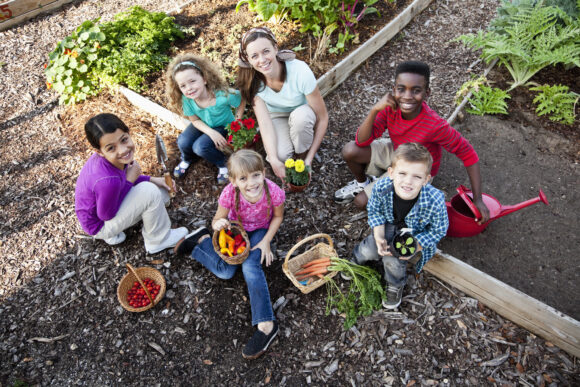 By Jennifer Shukaitis, assistant professor/educator, Department of Family & Community Health Sciences.
By Jennifer Shukaitis, assistant professor/educator, Department of Family & Community Health Sciences.
Summer has arrived in New Jersey, and with it, the longer, sunnier days that can inspire people to (literally!) dig in and garden. This year, gardening may be an especially beneficial activity as people emerge and recover from any negative experiences or feelings that COVID-19 restrictions imposed.
The Dirt on Gardening
About one-third of the United States’ population, or 117 million people, participates in gardening, making it second in popularity only to walking. However, gardening is more than just a simple pastime—those who garden may experience the many health benefits it offers.
You Reap What You Sow: Improved Nutrition
Being able to choose what you plant and having your own fresh-picked produce are major benefits of gardening. Gardening tends to take place close to home (either on one’s own yard or in a local community garden), making it easy to know exactly when produce is ripe and ready to harvest. Eating at peak ripeness is ideal for getting the most nutrients from produce. Most Americans do not eat enough fruits and vegetables, however studies show that people who grow their own produce are likely to eat a wider variety of fruits and vegetables, which are an important part of a nutritious diet.
No Gym? No Problem!
Gardening is considered a whole-body, moderate-intensity physical activity when it involves actions like raking, bending, weeding, and digging. Depending on the activity, gardening can burn between 250 and 500 calories per hour! The Centers for Disease Control and Prevention (CDC) recommends 2.5 hours of moderate-intensity physical activity per week, which breaks down to about 25 minutes per day. Those who garden are likely to participate in physical activity, on average, for 40-50 minutes longer than those who walk or bike, making it an ideal activity to meet those CDC guidelines. Exercise offers many health benefits, such as improved sleep and reduced risk of obesity, type 2 diabetes, and high blood pressure, as well as other diseases. Research shows that physical activity also helps people to relax and de-stress and helps to improve cognitive functioning.
Let the Sunshine In!
Gardening takes place mainly outdoors—this means sunshine! Being in direct sunlight stimulates your body to produce vitamin D. This important nutrient supports your immune system and helps with calcium absorption and bone health. Just 10 to 15 minutes of sunshine on the arms and legs can be enough to meet daily requirements. Exposure to sunlight is the most efficient way for our bodies to produce vitamin D, compared to getting it through food or supplements.
Emotional well-being is also enhanced by gardening. Sunlight can increase levels of serotonin in your brain, which can have anti-depressant and anti-anxiety effects; serotonin is a hormone that helps you relax.
Get Dirty!
Digging in the dirt may bring additional health benefits, thanks to the bacteria Mycobacterium vaccae. This organism has been studied for its anti-depressive and anti-inflammatory qualities on the brain, as well as for its ability to increase serotonin. Simply breathing in this bacterium while gardening may help to boost immunity and decrease stress levels.
Focus and Purpose
Some studies suggest that simply being in nature may help improve feelings of life satisfaction and may even improve focus, especially in those with ADHD. Gardening can inspire a sense of purpose and agency; seeds, seedlings, and plants have specific needs that gardeners must meet for them to survive. Seeing plants grow and thrive can be a rewarding experience for the gardener.
Very Handy
Gardening tends to involve weeding, digging, and planting. In addition to keeping the garden healthy, these actions can also help to improve the strength of your hands as well as improve dexterity and fine motor skills.
For Kids
Some studies suggest that exposure to the microbes present in soil at an early age has lasting benefits, such as reduced risk of allergies and certain auto-immune diseases. Research also shows that kids who garden tend to eat more fruits and vegetables throughout their lifetimes.
For Older Adults
Older adults in particular may enjoy improved health from gardening. Studies show that gardening can greatly decrease risk of dementia, combat loneliness (which tends to disproportionately affect older adults), and even improve balance, which in turn can decrease the risk of suffering fractures resulting from falls. Remember the benefits of sunshine! Because vitamin D production tends to decrease as people age, gardening can be an especially good activity for older adults to help ensure that they get enough sunlight to stimulate vitamin D production.
Ready, Set, Go!
Now, get out there and get gardening! Your mind and your body will thank you. Check out the RU Ready to Garden series to learn more about starting and maintaining your garden: go.rutgers.edu/i217fnc5
This article originally appeared in the July, 2021 issue of Gardener News.

